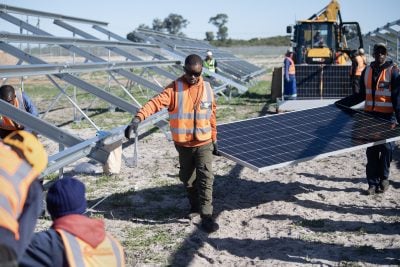With its sprawling population, agricultural potential and commercial promise, Ibadan could rival Lagos as an economic hub. But there are many challenges to overcome.
Ibadan, the city of brown rusty roofs, was once the capital of Western Nigeria. It’s now the capital of Oyo State. It was the driving force of change in the entire region, churning out ideas, projects and people that transformed the region, the country and the continent. Yet today, the city plays second fiddle to Nigeria’s financial capital of Lagos just 120km down the road – though some say it could rival the economic hub. In the 1960s, Ibadan was the largest city in Nigeria, and the third largest in Africa. But since then it has dropped down the pecking order and is now only the third-largest metropolitan area in the whole of Nigeria. That is not to say, however, that it is not huge and sprawling. According to the UN, Ibadan’s population stood at an impressive 2.84m in 2010. Five years after, it will certainly be higher.
Indeed, Ibadan attracts people from across the country. In 2012, for example, Emeka travelled from Enugu in the east in search of a better life.
“It was to look for better something,” he says riding his okada (motorbike). He moved westwards and weighed up the possibilities before settling on Ibadan where he has lived since. “Ibadan is closer to Lagos and not as expensive as Lagos… Here, you can save more,” he explains. While Lagos retains its significance as the economic seat of Nigeria, Ibadan holds a special place culturally. Several buildings testify to this such as Mapo Hall, the first hall in Ibadan, commissioned in 1929, and Bower’s Tower, commissioned in 1936.
Several establishments also confirm the place of Ibadan in Nigeria and Africa’s history. The University of Ibadan, established in 1948, is known to be the first university set up in the whole country. The Ibadan-based Western Nigerian Television was the first television station on the continent. And the city was, and still is, home to a variety of prominent organisations such as the International Institute for Tropical Agriculture (IITA) and the Nigerian Institute for Social and Economic Research (NISER).
According to Dipo Famakinwa, Director-General of Development Agenda for Western Nigeria (DAWN), Ibadan’s rich history informs its exciting present. “[The city’s history] affects the quality of thinking, the quality of the programmes, the quality of the projects and the quality of the people,” he says.
Untapped potential
However, while Ibadan’s prominent past may still reverberate through its streets and peoples today, it must also be recognised that Ibadan struggles to match the economic and business heights reached in the likes of Lagos.
“Business flows into Lagos more than Ibadan,” says Bashir Zungeru, a money changer whose great-grandparents moved to Ibadan from Zaria decades ago. “We don’t have an international airport, no seaport, no [coastal] border…You can be in Lagos and be making international business transactions.”
In contrast to Lagos, Zungeru points out, Ibadan’s infrastructure is somewhat lacking. The city has only two flyover bridges and many of the roads are narrow. The local airport meanwhile is hardly buzzing with activity and many residents go to Lagos in order to catch flights. Nevertheless, many agree that the potential for the city is enormous, and in 2012, Frontier Marketing Group listed Ibadan as one of Africa’s Top 10 Cities to Watch.
According to many businesspeople that have made it in Ibadan, understanding the city’s consumers and their preferences is crucial to doing well there. Ibadan residents, for instance, are said to seek out high quality at low prices.
“People say it’s tougher here because an ordinary Ibadan person pays less compared to places like Lagos where I came from,” says Olumide Bisiriyu, one of the many businesspeople that have tried to succeed in Ibadan.
Bisiriyu, an estate surveyor, moved his business from Lagos to Ibadan in 2013. He faced various obstacles in making it work, but he proved that doing well in Ibadan is possible despite the challenges – and he is far from the only one to bet on the city.
For instance, there are now two Shoprite outlets in the city, including the largest Shoprite mall in West Africa. In November 2014, Flour Mills made Ibadan the home of its biggest palm oil refinery. Domino’s Pizza has two outlets. And the South African internet provider Smile Communications started its Nigerian expansion from Ibadan, to name just a few.
This influx of Nigerian and international businesses is good for the economy, says Famakinwa, but he emphasises that it may be agriculture that holds the key to truly transforming the regional economy.
“Ibadan can actually become an agro-industrial zone for Nigeria. It can be one of the foremost agro-industrial zones for Africa if resources are well tapped,” he says. “[Oyo state] could be converted to that unique agricultural industrial zone that can feed many parts of the country.”
Famakinwa points to the fact that DAWN is headquartered in Cocoa House, which was built in the 1960s from proceeds of cocoa, rubber and timber. It was once the tallest building in tropical Africa and, according to Famakinwa, the grand edifice still stands tall as a testament to what is possible if agriculture is explored and developed to its full potential.
The way forwards
Few dispute the possibilities open to Ibadan, but the city still has a long way to go if it is to fulfil its promise, and large gaps in both its services and markets remain.
The state government is overburdened with waste management yet where is Ibadan’s Wecyclers to take on this challenge? The transportation sector is craving a rush of new energy to reinvigorate its old tired buses, yet where is Uber for young people who want to get around? The cultural sector also needs a fresh look, yet where are the entertainment companies to run regular shows in the city?
Some residents of Ibadan are waiting for innovative and courageous companies to take the plunge to fill these needs, but others point out that economic activity cannot be divorced from the political environment and the policies put in place to attract businesses. On that front, Zungeru believes the current leadership is showing some positive signs.
“Things have been better since Ajimobi came in,” he says, referring to Abiola Isiaka Ajimobi, the governor of the state who was re-elected in April 2015. He was the first governor of the state to be elected for two terms, and residents of the region hope that this continuity will allow the administration to implement longer-term policies.
“You need a government focused on bringing all those possibilities on the table,” says Famakinwa of the region’s promise. “You also need stability….But you need to bring all the resources together: the people, the institutions, the economic advantages…to achieve economic development.”
In May 2015, Governor Ajimobi signed a Memorandum of Understanding with a Chinese company to build a light rail of about 30km within the city. Famakinwa believes that these kinds of infrastructural projects could be a real boost for the economy not just of the city but of the broader area.
“It will boost the economy of the region by between 120-150%,” he predicts. “That’s an area that we need to focus on. The latent capacity in the region will be further developed if we have rail connection.”
Ibadan’s present is far from being as glorious and impressive as its fondly remembered past. However, its future is yet to be written – and if the city’s vast and brimming potential is confronted, understood and harnessed, it could hold even greater riches for Ibadan’s generations to come.
Temitayo Olofinlua
Want to continue reading? Subscribe today.
You've read all your free articles for this month! Subscribe now to enjoy full access to our content.
Digital Monthly
£8.00 / month
Receive full unlimited access to our articles, opinions, podcasts and more.
Digital Yearly
£70.00 / year
Our best value offer - save £26 and gain access to all of our digital content for an entire year!

 Sign in with Google
Sign in with Google 



